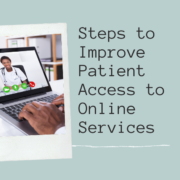Steps to Improve Patient Access to Online Services
The telehealth market is expected to experience an 80% year on year growth in 2020 as a result of the pandemic, with telehealth services easing the burden on traditional healthcare systems by urging patients with mild or moderate ailments to use web-based applications for treatment or management. Telemedicine also takes the lead in the cancer care strategy during the coronavirus outbreak and will continue to play a role in the future to support symptom management, lifestyle changes, and medication protocols. Therefore, access to online services to support patients with cancer is crucial to coordinate care from availing of financial aid and medical services to legal and psychological support. Empowering the patient to take control of their overall care using internet-based technologies can improve care coordination with medical and legal professionals and may also reduce the burden on the health care system.
Learn to Navigate the Web
Of vital importance to accessing online services is knowing how to use the internet to search for resources that you may need. In addition to the basics of having an email that you use to communicate, you must familiarize yourself with the main features of browsers such as clearing cache, bookmarking, and viewing history as well as the practicality of tabbed browsing.
Another important aspect of being internet savvy is to learn to use search engines such as Google, Bing, or Duck Duck Go effectively that will enable you to find answers to queries on all types of subjects. Know that you can also filter and refine your search to yield results that are suitable to your queries. Hence, if you are looking for lawyers that can help you find financial assistance for your cancer treatment, it will save you time since most professional websites are optimized for search engines nowadays. Professional sites do this by providing relevant and authoritative content that are useful to website visitors ranking them high whenever a query is typed in the search engine and results are displayed. Keywords that are often used by surfers are also incorporated in the text and articles of sites, making these portals easy to find by search engines.
Retrieve Information and Benefit From Online Access
Now that you are confident about using internet technology, there are many things that you can do online to assist in your cancer care management. One of the constraints in cancer care is health insurance. Access to government portals and organization websites such as the Social Security Administration (SSA) for disability insurance benefits or the Cancer Financial Assistance Coalition (CFAC) which offers a data base of financial resources can already give you leads on where to get financial aid.
Although many people are benefiting from treatment outside of hospitals due to mounting medical costs, declining number of doctors, and an older cohort of patients who are living longer, outpatient care can lead to a decrease in support delivered by health care staff. The good news is internet-based tech including patient portals, websites, and apps can tip the scale to balance the perceived support deficiency.
The ability to access health records, choose health providers and place of treatment, book and cancel appointments online, find psychological support, and order prescription refills virtually are major steps in cancer care management. Telephony is also another feature of the internet offering free phone calls if a patient needs to talk to a healthcare provider or specialist urgently. Other forms of communication with doctors and hospitals include forums such as message boards and instant messaging. Mobile applications
Improved access to online services by learning to navigate the web efficiently and effectively can open up an entire virtual world to a person with cancer. It also empowers a patient by managing the coordination of their condition with different actors such as oncologists, lawyers, therapists, and psychologists.










